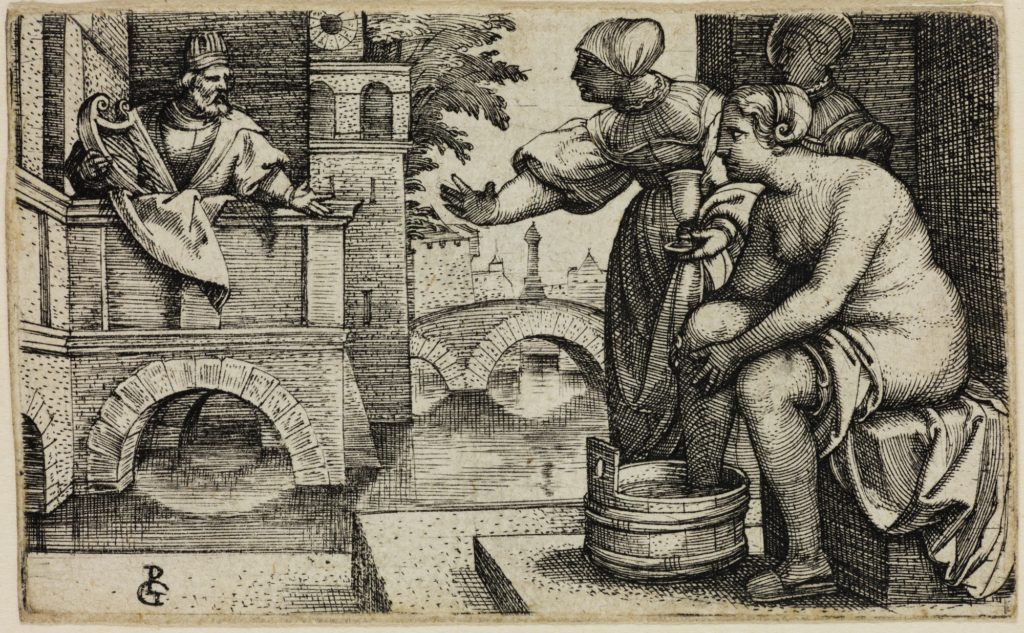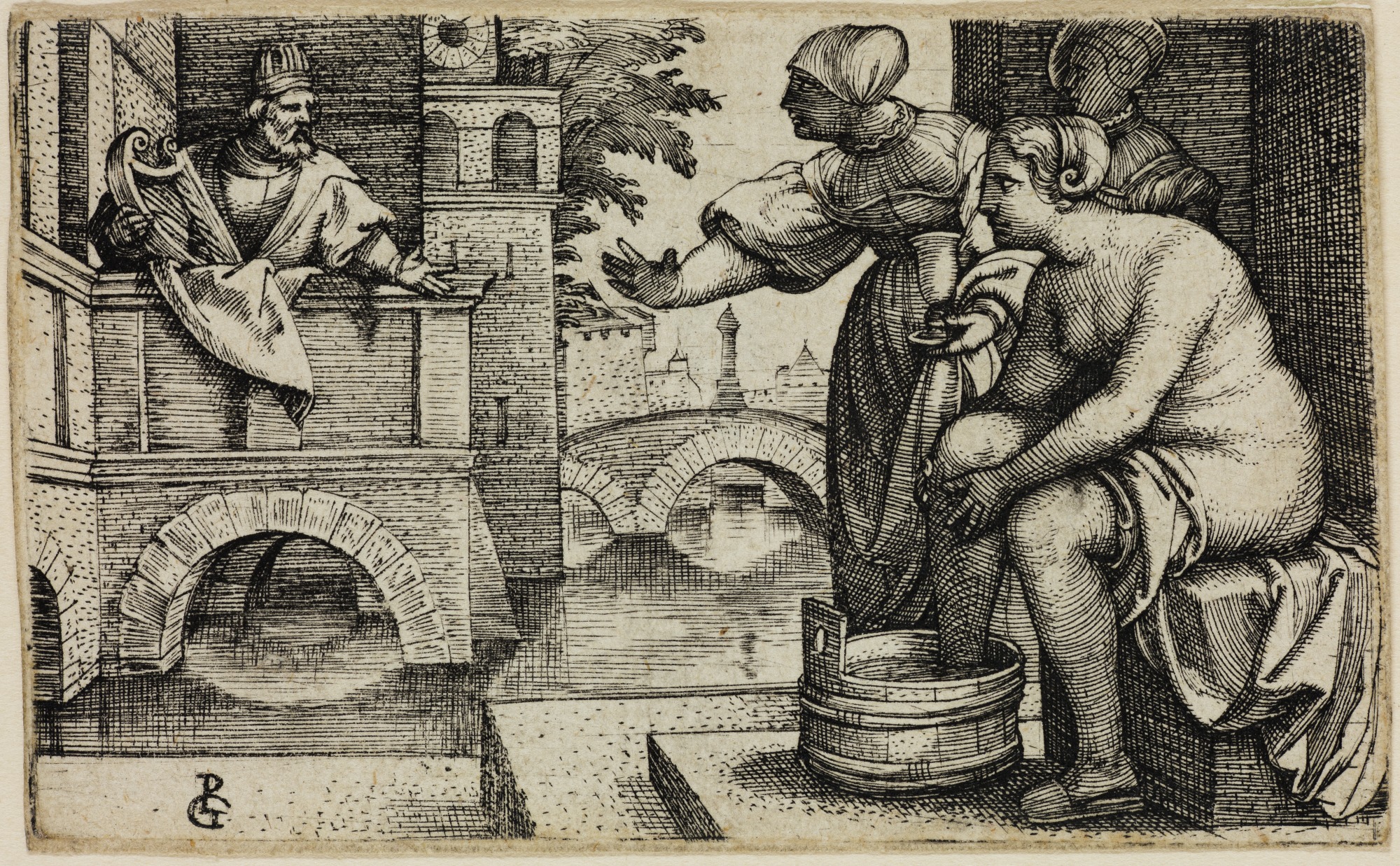
Devotions on 2 Samuel 12:1-9, Psalm 51:1-9–David and Bathsheba
October 15-21, 2018
Monday, October 15, 2018–David and Bathsheba
“But the thing that David had done displeased the Lord” (2 Samuel 12:1a).
It was an off-handed comment; one that was said without thought. It was not meant to offend, but rather to be funny. As it turned out it was offensive and not funny. Ken tried to brush the comment off and say it didn’t matter, but it sank deeper and deeper into his heart. The best course of action for Ken would have been to confront the person who made the flippant remark and seek to repair the bruised relationship. Ken said nothing, though, and the relationship grew cold and died.
Thankfully the Lord values relationships more than Ken did. King David’s rape of Bathsheba and murder of her husband Uriah offended the Lord. God didn’t remain quiet, though. God sent the prophet Nathan to confront David with his sin. Guilt and shame were not the goals of God’s action, but rather a healed and strengthened relationship.
Like David we have offended the Lord by what we have said, done and left undone. God’s Spirit moves within us to convict us of our sin and empower us to confess, repent and receive God’s unconditional forgiveness. We are too valuable to God for God to remain silent.
Forgiving God, thank you for your love, which we see in Jesus the Christ. Thank you that you love us so much that you also convict us of our sin and convince us of our forgiveness, so that we can walk in a close relationship with you. Amen.
Tuesday, October 16, 2018–David and Bathsheba
“There were two men in a certain city, the one rich and the other poor” (2 Samuel 12:1b).
In the United States, the division between the haves and the have nots is often in the news. Mitt Romney, when he ran for the presidency, talked about 47% of the people not voting for him because they were on the government dole. Recently it was pointed out that the upper 1% accumulated a disproportionately large amount of wealth compared to 99% of the population. In a land of abundance, where even the poorest citizens are among the wealthiest 3% of the world’s population, most Americans don’t feel that they have enough.
David didn’t think he had enough. He had wives and concubines, wealth and a kingdom but he didn’t have Bathsheba—Uriah did. Wanting more, the rich stole from the poor. David’s actions were appalling, but not surprising. We see such things happen every day. In fact, if we are honest, we must confess that we too oppress the poor. We withhold our blessings from them and we focus on our own needs rather than theirs.
We follow Jesus, though, who cared for the poor and needy. We have failed to carry on Jesus’ ministry. This is something we need to confess, but we need to go farther. We need to think of ways that we can creatively meet the needs of the poor and serve them.
Gracious God, we admit our tendency to act like David. Forgive us. Inspire us that we might creatively, effectively share our blessings and care for those in need. Amen.
Wednesday, October 17, 2018–David and Bathsheba
“The man who has done this deserves to die” (2 Samuel 13:6).
When it comes to punishment, we tend to want judgment on others and mercy on ourselves. The prophet Nathan trapped King David with a hypothetical story. David’s response to Nathan might have been different had Nathan been more direct and told him his relationship with Bathsheba was wrong. If David was like us, he might have made excuses. “Gosh God I was tired, stressed and the opportunity just presented itself. I’m sorry, but it really wasn’t my fault.”
When David passes judgment, he declares that the man should die. God’s judgment is different. God declares that the man should be forgiven. Certainly we reap the natural results of our sinful behavior. God, however, isn’t out for revenge. God always seeks to repair and renew relationships.
Merciful Lord, we stand in awe at your willingness to forgive. Keep us from taking advantage of your unconditional forgiveness. Enable us to be your faithful and obedient servants. Amen.
Thursday, October 18, 2018–David and Bathsheba
“I gave you your master’s house” (2 Samuel 12:8)
David was a restless spirit. He had accomplished great things. God had blessed him beyond most people’s imagination. David, though, was not content. He wanted more. David wanted to expand the boarders of Israel. He wanted more riches and to build greater buildings. David wanted Bathsheba. David was not content.
We can understand David better than we might first suppose. We are richly blessed, but we want more. At the core of our being we don’t believe that we have enough. God hasn’t given us everything we need (want). The Lord is not a God of abundance. We tell ourselves that God is holding back; God is stingy. We are not content.
We can beg God to give us more; to feed our cravings. We might eventually be content. There is a better way, though. We can give thanks for what we have. We can look around us and become aware of all that God has given us; all of God’s provision and protection. We can remind ourselves—through our thankfulness and gratitude—that we have more than enough. In fact, we have so much that we may want to share it with others and give it away.
Abundant God, forgive us when we think we don’t have enough. Open our eyes that we may be aware of your gracious blessings. Enable us to live lives of thankfulness and gratitude. Amen
Friday, October 19, 2018–David and Bathsheba
“Have mercy on me O God” (Psalm 51:1)
David stood condemned. Adultery and murder were both punishable by death. As King, he would never stand before an earthly court and have his fate decided. David knew, though, that he did stand before God. He could not mount a defense. David could only ask for mercy—that God would withhold from David what he deserved.
It is not easy to stand alone with our destiny in the hands of another. Things are out of our control and we are helpless—but not hopeless. At those times, we come face to face with our dark side, a part of us that we try to hide and we do not like. We also come face to face with our Lord. We can focus on our sinfulness and in doing so be filled with despair and hopelessness. Or we can turn to the God of love and mercy and be filled with hope.
God of mercy, may our sinfulness not overwhelm us. May we rejoice in your mercy and live each day in hope. Amen.
Saturday, October 20, 2018–David and Bathsheba
You desire truth in the inward being; therefore teach me wisdom in my secret heart” (Psalm51:6).
We’re pretty good liars. We tell ourselves that what we said and did were excusable. We convince ourselves that we are God’s gift to creation, or that we are worthless and the chief of all sinners. We measure ourselves against those people around us and wonder why our findings are skewed. If God desires truth, where will we find that truth?
Our only true measurement comes from the Lord. The only opinion about sin and worth are those of God. Truth in our secret heart comes as the Holy Spirit moves in our lives and reveals what is pleasing and displeasing to the Lord. Truth is revealed to us. When it is, we will learn that we are not perfect; that we are sinners in need of a savior. We will also learn that we are children of God—children who are loved, forgiven and empowered. Such truth, is frees us to live abundantly and to serve.
O God who sees all, enable us to see ourselves as you see us—to see the truth. Empower us with this truth so that we may love you and serve our neighbor. Amen.
Sunday, October 21, 2018–David and Bathsheba
“Purge me with hyssop” (Psalm 51:7).
Sometimes we need a good cleaning—not just a light dusting where we clean up the outside. We need a good cleaning inside, a cleaning that transforms us and allows us to get rid of a lot of clutter and baggage, which has collected over time. David looked to the Lord to provide such a cleaning and so should we.
Our cleaning is accomplished by the life, death, and resurrection of Jesus and the renewed relationship with God. The Holy Spirit moving freely in our lives provides a constant purging. Each day we are cleaned with the waters of our baptism—waters that cleanse us from sin, bring forth new life, bring us into God’s family and fill us with God’s Spirit.
Cleaning refreshes and renews us. We experience life differently when we are clean as opposed to when we are dirty. We are clean as only God can cleanse us.
Holy God, create in us a clean heart and put a new and right spirit within us. Amen.

